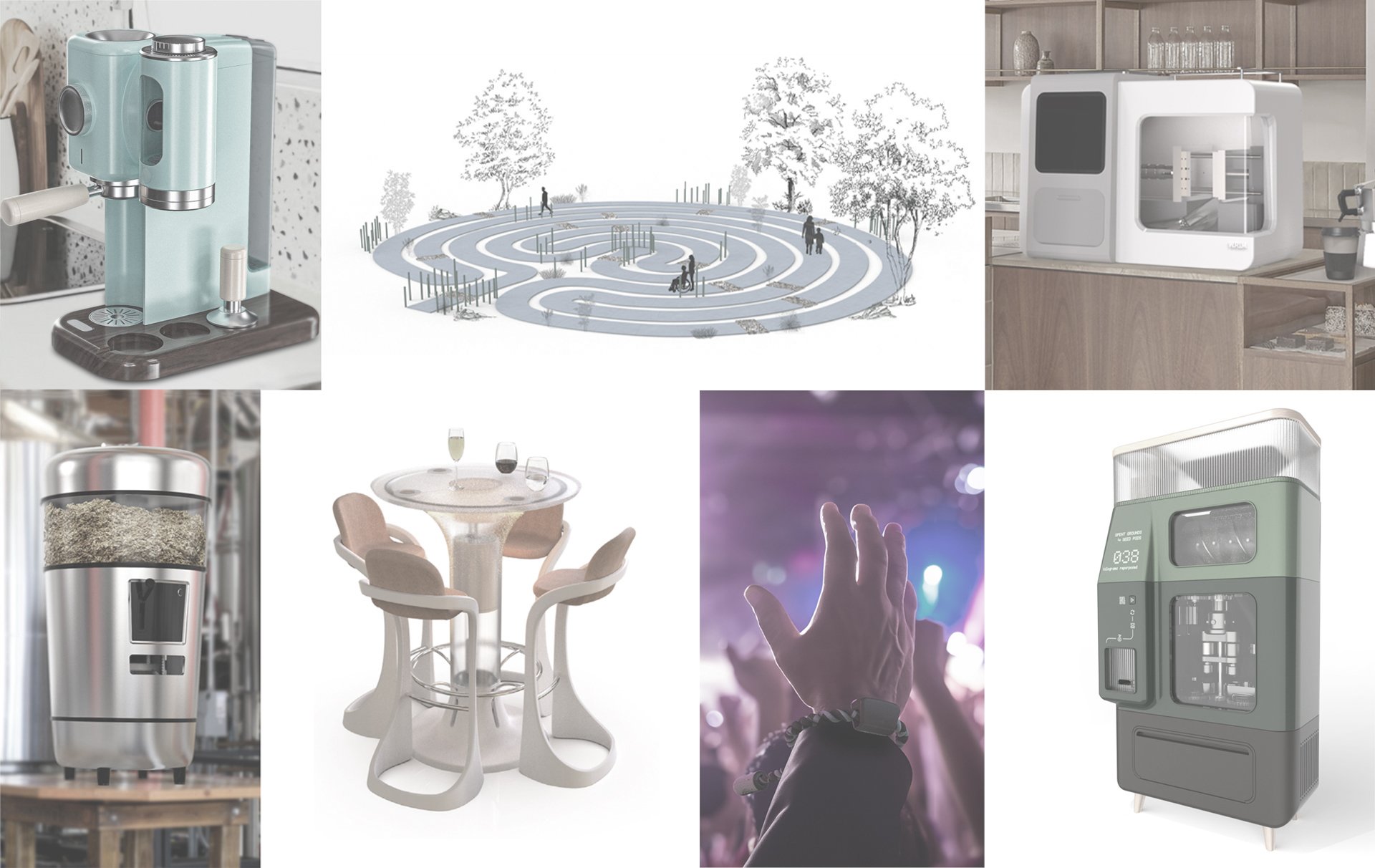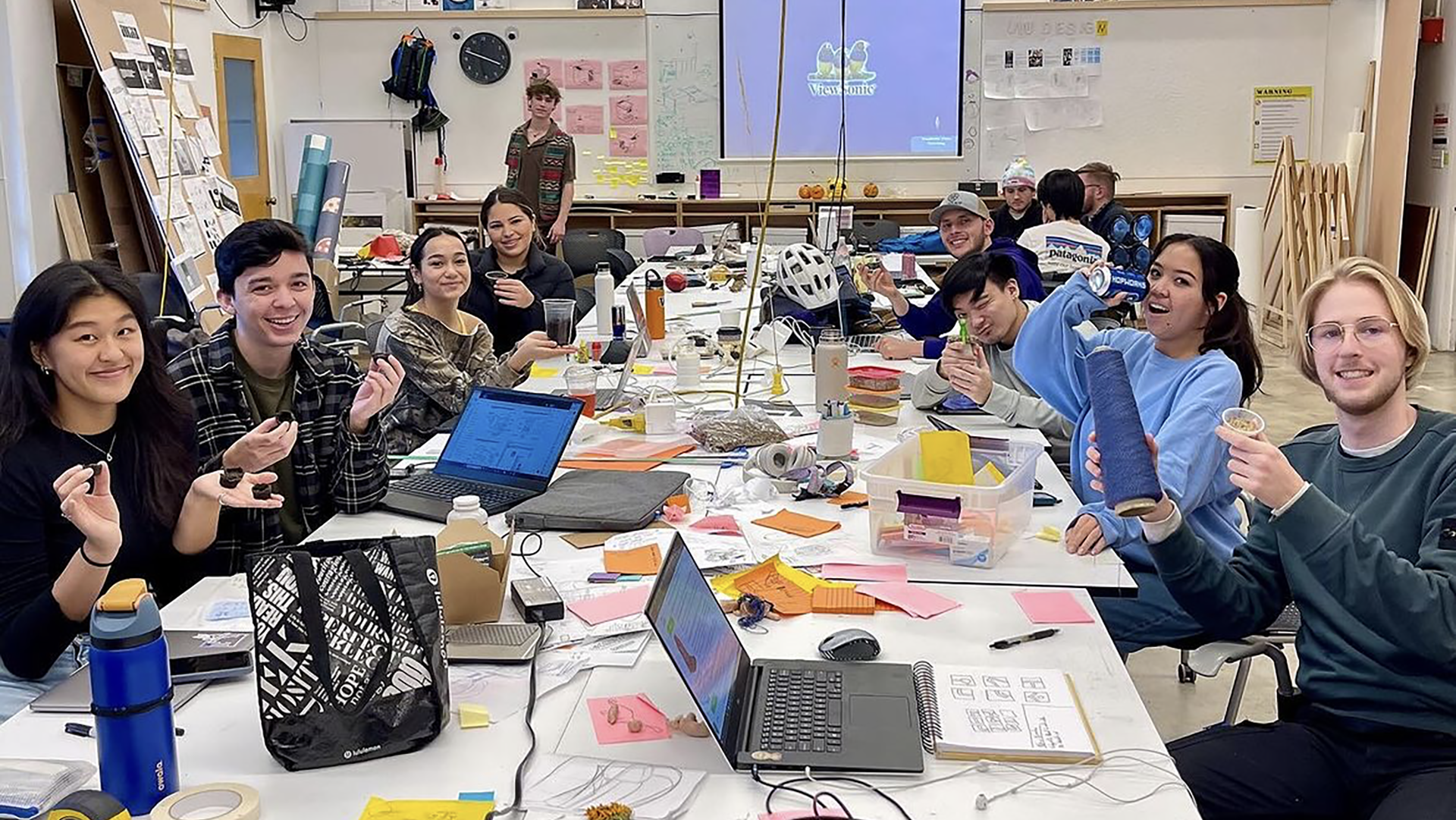UW Sponsored Project

UW :: Seattle AM/PM
Anvil Studios had the opportunity to sponsor the Senior ID class of 2024at UW during Autumn quarter 2023. The assignment was called “Seattle AM/PM”, and this project centered around a holistic, sustainable design approach for products catering to the morning coffee and evening cocktail/beer cultures.
The objective was to design a collection of products, furniture, and branding, that collectively support these ceremonial experiences, and explore how Seattle is infused into both of these.
The goal was to find solutions within the constraints of sustainability, emotionally durable designs, circular design, up-cycling.
UW Sr ID Professor
Meichun Liu
UW Sr ID Class of 2024
Tori D Cook
Conny Karina Flores
Devlin Frueh
Owen Michael Giese
Colton Brooks Jackson
Ho Kwon Kim
Ann Lai
Victoria Li
Olivia Avery Oomen
Kennedy Otani
Ana Paraiso
Sam Riera
Cole Young
TOCCO :: From Fairly Sourced Beans to Your Perfection Under 5 Minutes.
TEAM :: Ho Kwon Kim & Owen Giese
Our Goal: Create a sustainable alternative to single use coffee brewing by creating an innovative experience that empowers users to connect deeply with their morning coffee ritual.
TOCCO: TOCCO is the first machine on the market with an hourglass-like chamber to roast beans in one orientation and grind beans in the other. Our machine is designed to deliver a satisfying tactile experience that evokes an emotionally long lasting connection between the user and the product.
TOCCO Online Marketplace: TOCCO’s online raw coffee bean marketplace exclusively highlights Fair Trade Certified growers. It connects users to the hard working farmers who normally are subjected to reduced wages from advantaged corporate middlemen.
WRIM + CODA :: Reimagining sustainability at outdoor music festivals and other live events.
TEAM :: Olivia Oomen & Samuel Riera
CODA :: A New Approach to Festival Goers
A new approach to educating festival goers and engaging them in sustainable behaviors. A new approach to festival merchandising encouraging responsible production. Coda connects festivalgoers with one another via an app that allows for scanning each individuals Coda’s code. The app streamlines the shopping service, sharing of memories, and also serves as an immersive learning experience.
LUMESA :: Sustainable Bar Furniture
TEAM :: Devlin Frueh & Ann Lai
Lumesa is a bar table and stool set that aims to bring sustainability to light through a playful and interactive approach. The bar table’s footrest harnesses gravity and weight to generate kinetic energy. As you step on the footrest, the weight in the table rises, creating kinetic energy as it falls with gravity. Just a few steps power the table’s glow and charge your phones simultaneously.
When you set your phone on the charger, a notification screen prompts you to explore kinetic energy via an interactive interface. Discover how the table converts “steps to watts,” visualise energy generation, and en- joy kinetic energy-infused drinking games. These inter- actions encourages sustainability discussions in public as well as prioritising bar safety to ensure bar goers’ phones are charged for a safe journey home.
TACE CENTER :: Meditation Labyrinth Experience in Hospital Integration
TEAM :: Colton Jackson
Tace Centre is an experience located in the courtyard of Seattle Children’s Hospital. It consists of a walking meditation labyrinth, handmade earthenware mugs, and custom bamboo mug stands. The different aspects of the experience utilize sustainable materials and are meant to encourage waste reduction and mindfulness. Unlike a maze, labyrinths have a single pathway that is followed in towards then center, then out again to the exit. There are no dead-ends or false pathways. Walking labyrinths have been utilized by numerous cultures for thousands of years as a form of meditation. Part of Tace Centre, Latin for “Quiet Center” is a walking labyrinth meant to be an opportunity for reprieve for overwhelmed faculty and visitors from the stressful hospital environment. The length of the walkway, made with concrete utilizing spent coffee grounds as a replacement for the fine aggregate in composite concrete, is designed with cafe-goers in mind. The adjusted length of the path is meant to take about 15 minutes to fully complete. This is the average amount of time a person takes to drink a cup of coffee, as well as less than the faculty’s typical short break. Tace Centre provides both the space and time to escape the chaotic and overwhelming hospital environment, and find a moment of peace and respite.
There are 14 equally spaced waypoints throughout the labyrinth that are filled with the pieces of broken mugs. These waypoints create a contrast in both sound and texture when walking over them. Because the waypoints are equally spaced, they create a repetative and methodic reminder of ones presence in the labyrinth.
These handmade earthenware mugs are created with local clay. They use spent coffee grounds as a grog to stabilize and strengthen the clay. Coffee and coffee grounds are used during the glazing
process as well. Coffee, when fired in a kiln around 1000°C carbonizes and turns a beautiful red-orange. The shape of the cups is inspired by tulip flowers and the stem is meant to act as an insulator, similar to the stem of a wine glass.
The custom earthenware mugs have a symbiotic relationship with the “mug stands” spread throughout the labyrinth. Made from bamboo stalks, these stands create the per- fect pedestal for one to rest their beverage on. The mug stands encourage those on their journey through the labyrinth to put their drink down, stand still, and observe their environment. The relationship between the mug and the stand, and their reliancy on one another, discourages people from taking the mugs home and returning them to the cafe.
GROUNDS :: Repurposing Coffee Grounds
TEAM :: Victoria Li & Cole Young
Grounds is a system that visualizes the spent coffee grounds generated at local coffee shops and creates compostable planter pods for customers to take and use. It focuses on encouraging users to compost and addresses the increase in landfill from coffee consumption.
After the brewing process, spent coffee grounds can be repurposed into new materials, which are especially suitable for low-cost composting as they can biodegrade and release high levels of nutrients, becoming great fertilizer for a user’s plant collection. Grounds features a continuous compression molding system that creates the pod cups and lids with other natural ingredients, forming the perfect carrier for plant seeds. Its structure supports natural ventilation and guides users throughout the molding process. Grounds is not just a waste management solution; it’s a sustainable ecosystem fostering responsible coffee consumption and environmental stewardship.
After collecting a seed pod, users can add their chosen plant into a collection via the Grounds app. The app also allows users to explore, redeem, and learn.
STOUT :: Sustainable Plastic Ring Alternative
TEAM :: Ana Pariso & Kennedy Otani
STOUT is a new way to package canned beer sustain- ably. By using excess grain produced from the brewing process, we can combine it with a gelatin resin to create a fully biodegradable replacment to single-use plastics. Inspired by fermenters found in every brewery, we created a device that can heat, mix, press, and cure our resin/grain compound into a hardened ring to hold beer cans.
Over 200 million tons of spent grain is produced in the U.S. every year. Most breweries either give it away to farms for feed, or throw it out. STOUT is designed to repurpose the grain, giving it a second life. We also hope to help build a stronger bridge from customers to the beer that they are drinking.
UW ID Class of 2024








